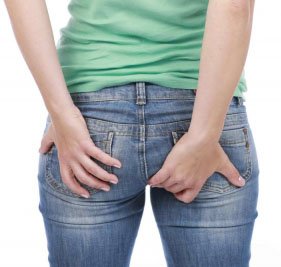The medical term for anal itching is pruritus ani, which is Latin for “itchy anus”. It is a condition where the skin around the anus becomes itchy and the affected person has the urge to scratch the area to obtain relief. However, while scratching can provide temporary relief it can also have the effect of exacerbating or perpetuating the problem by stimulating nerve fibres and causing inflammation leading to what is known as the “itch-scratch cycle”.
Pruritus ani is not a disease but rather, a symptom of an underlying condition although it may not always be possible to determine exactly what that underlying condition might be. Where a specific underlying cause cannot be identified this is known as the “primary” form of pruritus ani or “idiopathic” pruritus ani. The secondary form of pruritus ani is that which has a specifically identifiable cause.
Some of the more common causes of chronic (ie: ongoing) anal itching are as follows:
Anal Hygiene
Anal Hygiene habits play a huge role in causing and/or prolonging anal itching. When the area isn’t properly or completely cleaned after bowel motions the faecal remains and/or moisture can cause irritation to the sensitive perianal skin resulting in the urge to scratch. Somewhat ironically, excessive cleaning using harsh, dry toilet paper or soaps containing fragrances can also cause anal itching.
It is therefore important is to clean the area properly. If bathing following bowel movements isn’t practical, fragrance and alcohol free toilet wipes are preferable to dry toilet paper (see: https://dermoscribe.com/ichybum-flushable-anal-wipes/).
Contact with Chemical Irritants
The use of scented soaps or other chemical irritants contained in some medicines (eg: chemotherapy) or ointments can cause pruritus ani. The use of alcohol and fragrance-free soap when washing the anal area is an extremely important part of any program for the treatment program of pruritus ani.
Dietary Habits
It is possible that certain food types including coffee, spicy foods, energy drinks, tomatoes and chocolate may cause or exacerbate anal itching. In accordance with widely accepted dietary advice, it is advisable to eat a healthy, balanced diet and to drink water regularly in order to stay hydrated. It is also sensible to avoid spicy foods if these aggravate an anal itching condition.
Different types of infections, skin conditions and diseases
There many types of infections that can cause, amongst other symptoms, anal itching. These include:
- fungal infections such as candida,
- skin conditions like eczema, psoriasis and dermatitis
- sexually transmitted infections including herpes and anal warts
- bacterial infections
- pinworms, threadworms and tape worms
- medical conditions such as chronic diarrhea, anal fissures (small cuts in the lining of the anus), haemorrhoids, Crohn’s disease and in rare cases, tumors and local cancers

